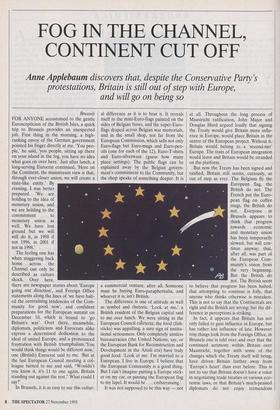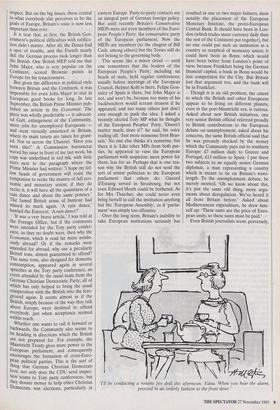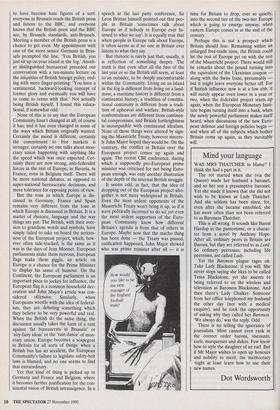FOG IN THE CHANNEL, CONTINENT CUT OFF
Anne Applebaum discovers that, despite the Conservative Party's
protestations, Britain is still out of step with Europe, and will go on being so
Brussels FOR ANYONE accustomed to the gentle Euroscepticism of the British Isles, a quick trip to Brussels provides an unexpected jolt. First thing in the morning, a high- ranking envoy of the German government pointed his finger directly at me. 'You peo- ple,' he said, 'you people, sitting up there on your island in the fog, you have no idea what goes on over here.' Just after lunch, a long-serving Eurocrat continued, 'Here on the Continent, the mainstream view is that, through ever-closer union, we will create a state-like entity.' By evening, I was better prepared. 'We are holding to the idea of monetary union, and we are holding to the commitment to monetary union as well. We have lost ground but we will still do it, in 1998 if not 1996, in 2001 if not in 1998.'
The feeling one has when staggering back home across the Channel can only be described as culture shock. Over here, there are newspaper stories about 'Europe going our direction', and Foreign Office statements along the lines of 'we have halt- ed the centralising tendencies of the Com- munity for good now', and confident preparations for the European summit on December 10, which is bound to 'go Britain's way'. Over there, meanwhile, diplomats, politicians and Eurocrats alike express a determined dedication to the ideal of united Europe, and a pronounced frustration with British triumphalism.`You would think things would be different now,' one (British) Eurocrat said to me. 'But at the last European Council meeting a col- league turned to me and said, "Wouldn't you know it, it's 11 to one again, Britain standing out against the rest." What could I say?'
In Brussels, it is as easy to see this cultur- al difference as it is to hear it. It reveals itself in the mini-Euro-flags painted on the sides of Belgian buses, and the super-Euro- flags draped across Belgian war memorials, and in the small shop, not far from the European Commission, which sells not only Euro-flags but Euro-mugs and Euro-pen- cils (one for each of the 12), Euro-T-shirts and Euro-silverware (guess how many place settings). The public flags can be explained away by the Belgian ,govern- ment's commitment to the Community, but the shop speaks of something deeper. It is a commercial venture, after all. Someone must be buying Euro-paraphernalia, and whoever it is, isn't British.
The difference is one of attitude as well as symbol and rhetoric. 'Look at me,' a British resident of the Belgian capital said to me over lunch. We were sitting in the European Council cafeteria; the food (fish- sticks) was appalling, a sure sign of institu- tional seriousness. Only completely aimless bureaucracies (the United Nations, say, or the European Bank for Reconstruction and Development in the Attali era) have truly good food. 'Look at me. I'm married to a European. I live in Europe. I believe that the European Community is a good thing. But I can't imagine putting a Europe stick- er on my car, or pinning the European flag to my lapel. It would be . . . embarrassing.'
It was not supposed to be this way — not at all. Throughout the long process of Maastricht ratification, John Major and Douglas Hurd argued loudly that signing the Treaty would give Britain more influ- ence in Europe, would place Britain in the centre of the European project. Without it, Britain would belong to a 'second-tier' Europe. The train of European integration would leave and Britain would be stranded on the platform.
In fact, it appears that Britain has not only failed to gain influence in Europe, but has rather lost influence of late. However rosy things look from the Foreign Office, in Brussels one is told over and over that the continued acrimony within Britain over Maastricht, together with some of the changes which the Treaty itself will bring, have driven Britain farther away from `Europe's heart' than ever before. This is not to say that Britain doesn't have a voice in negotiating trade treaties or various eco- nomic laws, or that Britain's much-praised diplomats do not enjoy tremendous respect. But on the big issues, those central to what everybody else perceives to be the goals of Europe, Britain's voice is now less important than ever.
It is true that, at first, the British Gov- ernment's political difficulties with ratifica- tion didn't matter. After all, the Danes had a spot of trouble, and the French nearly did; the German process took longer than the British. One British MEP told me that John Major, who is very popular on the Continent, scored Brownie points in Europe for his tenaciousness.
But given the difference in political style between Britain and the Continent, it was impossible for even John Major to stay in European good books for long. In late September, the British Prime Minister pub- lished an article in the Economist. The piece was wholly predictable — it advocat- ed Gatt, enlargement of the Community, more jobs for unemployed Europeans and went virtually unnoticed in Britain, where its main tenets are taken for grant- ed. Not so across the Channel. 'Have you seen this?' A Commission bureaucrat waved his issue in front of me last week; his copy was underlined in red ink, with little stars next to the paragraph where the Prime Minister had written: 'I hope my fel- low heads of government will resist the temptation to recite the mantra of full eco- nomic and monetary union; if they do recite it, it will have all the quaintness of a rain dance and about the same potency.' The famed British sense of humour had missed its mark again. 'A rain dance,' howled the Eurocrat. 'A rain dance?'
It was a very brave article,' I was told at the Foreign Office, but if the comments were intended for the Tory party confer- ence, as they no doubt were, then why the Economist, which is read far more assidu- ously abroad? Or if the remarks were intended for abroad, why use a peculiarly British tone, almost guaranteed to offend? The same tone, also designed for domestic Consumption, appeared again in several speeches at the Tory party conference, an event attended by the usual team from the German Christian Democratic Party; all of Which has only helped to bring the usual exasperation with the British into the fore- ground again. It seems almost as if the British, simply because of the way they talk about Europe, were destined to offend everybody, just when acceptance seemed within reach.
Whether one wants to call it forward or backwards, the Community also seems to be heading in directions which the British are not prepared for. For example, the Maastricht Treaty gives more power to the European parliament, and consequently encourages the formation of cross-Euro- pean political parties. This is the sort of thing that German Christian Democrats love; not only does the CDU send inspec- tion teams to Tory party conferences, but they donate money to help other Christian Democrats win elections, particularly in eastern Europe. Party-to-party contacts are an integral part of German foreign policy. But until recently Britain's Conservative MEPs were not even members of the Euro- pean People's Party, the conservative party of the European parliament. Now the MEPs are members (to the chagrin of Bill Cash, among others) but the Tories still do not belong to the governing body.
This seems like a minor detail — until one remembers that the leaders of the European People's Party, including six heads of state, hold regular conferences, usually before meetings of the European Council. Helmut Kohl is there, Felipe Gon- zalez of Spain is there, but John Major is not, and won't be, because too many of his backbenchers would scream treason if he appeared, and too many others just don't care enough to push the idea. I asked a recently elected Tory MP what he thought of the European Peoples' Party. 'Doesn't matter much, does it?' he said, his voice trailing off. 'Just more nonsense from Brus- sels.' No one else thinks it's nonsense, but there it is. Like other MPs from both par- ties, he appeared to view the European parliament with suspicion: more power for them, less for us. Perhaps that is one rea- son why the British still do not send the sort of senior politician to the European parliament that others do: Giscard d'Estaing served in Strasbourg, but not even Edward Heath could be bothered. As for Mrs Thatcher, she could never even bring herself to call the institution anything but the 'European Assembly', as if 'parlia- ment' was simply too offensive.
Over the long term, Britain's inability to take European institutions seriously has resulted in one or two major failures, most notably the placement of the European Monetary Institute, the proto-European Central Bank. It should have been in Lon- don (which trades more currency daily than the rest of the Continent put together), but no one could put such an institution in a country so sceptical of monetary union; it could have been in Bonn, which would have been better from London's point of view, because Frankfurt being the German financial capital, a bank in Bonn would be less competition for the City. But Britain lost that argument too, and the bank will be in Frankfurt.
Though it is an old problem, the extent to which the British and other Europeans appear to be living on different planets, even in the post-Maastricht era, is curious. Asked about new British initiatives, one very senior British official referred proudly to British contributions to the European debate on unemployment; asked about his concerns, the same British official said that he was privately shocked by the money which the Community pays out to southern Europe: £7 million daily to Greece and Portugal, £13 million to Spain. I put these two subjects to an equally senior German diplomat, a man representing a country which is meant to be on Britain's wave- length. To the unemployment debate, he merely snorted, 'Oh we know about this, it's just the same old thing, more argu- ments about deregulation. We've heard it all from Britain before.' Asked about Mediterranean expenditure, he drew him- self up: 'These sums are the price of Euro- pean unity, so these sums must be paid.'
Even British journalists seem, perversely, `I'll be conducting a routine fire drill this afternoon, Edna. When you hear the alarm, proceed in an orderly fashion to the front door.' to have become hate figures of a sort: everyone in Brussels reads the British press and listens to the BBC, and everyone knows that the British press and the BBC are, by Brussels standards, anti-Brussels. Meeting a member of the British press is a chance to get even. My appointment with one of the more senior Germans in Brus- sels prompted the line, 'You British, you just sit up on your island in the fog.' Anoth- er distinguished bureaucrat preceded our conversation with a ten-minute lecture on the iniquities of British foreign policy, end- ing with more finger-pointing: 'You have a sentimental, backward-looking concept of former glory and eventually you will have to come to terms with that.' Not actually being British myself, I found this educa- tional, if somewhat odd.
None of this is to say that the European Community hasn't changed at all; of course it has, and it has even changed in some of the ways which Britain originally wanted. Certainly the mood is different, certainly the commitment to free markets is stronger, certainly no one talks about mon- etary union happening with anything like the speed which was once expected. Cer- tainly there are now strong, anti-federalist forces in the rest of Europe, in Bavaria, in France, even in Belgium itself. There will be more national debates, as opposed to super-national bureaucratic decisions, and more tolerance for opposing points of view.
But the tone in which Europe is dis- cussed in Germany, France and Spain remains very different from the tone in which Europe is discussed in Britain. It is a matter of rhetoric, language and the way things are put. The British, with their aver- sion to grandiose words and symbols, have simply failed to take on board the serious- ness of the European project, which, how- ever often side-tracked, is the same as it was in the days of Jean Monnet. European parliaments make them nervous, European flags make them giggle, an article on Europe is a chance for the Prime Minister to display his sense of humour. On the Continent, the European parliament is an important place to jockey for influence, the European flag is a common household dec- oration and John Major's article was con- sidered offensive. Similarly, when Europeans wrestle with the idea of federal- ism, they are debating something which they believe to be very powerful and real. When the British do the same thing, the discussion usually takes the form of a rant against 'fat bureaucrats in Brussels' or `airy-fairy ideas' or the 'rain dance' of mon- etary union. Europe becomes a scapegoat in Britain for all sorts of things: when a British bus has an accident, the European Community's failure to legislate safety-belt laws is blamed, and no one seems to find that extraordinary.
Yet that kind of thing is picked up in Germany and France and Belgium, where it becomes further justification for the con- tinental vision of British intransigence. In a speech at the last party conference, Sir Leon Brittan himself pointed out that peo- ple in Britain 'sometimes talk about Europe as if nobody in Europe ever lis- tened to what we say'. It is equally true that when people in Europe talk about Europe, it often seems as if no one in Britain ever listens to what they say.
But rhetoric is rarely just that; usually, it is reflection of something deeper. The truth is that even after all the fuss of the last year or so the British still seem, at least to an outsider, to be deeply uncomfortable within the Community. Living on an island in the fog is different from living on a land- mass; a maritime history is different from a continental history; a tradition of constitu- tional continuity is different from a tradi- tion of upheaval and warfare. British-style confrontations are different from continen- tal compromises, and British forthrightness is incompatible with continental idealism. None of those things were altered by sign- ing the Maastricht Treaty, however sincere- ly John Major hoped they would be. On the contrary, the conflict in Britain over the European project comes up again and again. The recent CBI conference, during which a supposedly pro-European prime minister was criticised for not being Euro- pean enough, was only another illustration of the depth of the internal British struggle.
It seems odd, in fact, that the idea of dropping out of the European project alto- gether is not more widespread in Britain. Even the most ardent opponents of the Maastricht Treaty won't bring it up, as if it were politically incorrect to do so; yet even the most ardent supporters of the Euro- pean Community know how different Britain's agenda is from that of others in Europe. Maybe now that the macho thing has been done — the Treaty was passed, ratification happened, John Major showed who was prime minister after all — it is time for Britain to drop, ever so quietly, into the second tier of the two-tier Europe which is going to emerge anyway, when eastern Europe comes in at the end of the century.
Perhaps this is not a prospect which Britain should fear. Remaining within an enlarged free-trade zone, the British could let the rest of Europe get on with the rest of the Maastricht project. There would still be remarks about the pound turning into the equivalent of the Ukrainian coupon — along with the Swiss franc, presumably — but it might leave everyone better off. For if British influence now is at a low ebb, it will surely appear even lower in a year or two, when the federalist project starts up again, when the European Monetary Insti- tute begins turning itself into a bank, when the newly powerful parliament makes itself heard, when discussions of the new Euro- pean defence and foreign policies begin — and when all of the subjects which bother Britain come up again, as they inevitably will.












































































 Previous page
Previous page